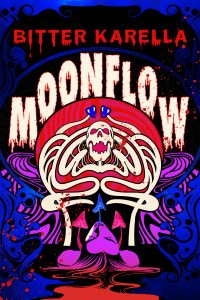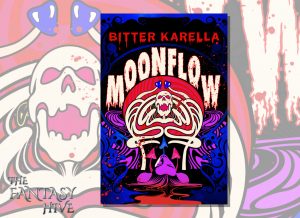MOONFLOW by Bitter Karella (BOOK REVIEW)
“Under the trees and the earth, under the roots of the towering spruce and the mighty fir, under strata of rich black loam and rocky clay, under the carcasses of ancient sequoias and redwoods, and finally under the worms and the slugs and the crawling things that ate them all, the Lord of the Forest sleeps. His veins pulse and throb in the dark earth.
He does not like the men and the way they trample through his forest. He does not like when they pull his mushrooms from the earth and stupidly mash them between their useless flat teeth. When they come into his forest, he twists their necks and turns their feet so that they can never find their way again.
So he sleeps, but even deep in slumber, he fumes with hate.”
Bitter Karella is a genderfluid writer currently best known for the Midnight Pals microfiction account, an amusing social media gag that betrays both a strong grasp of characterization and an impressive knowledge of the history of Weird and horror fiction. But as soon as Moonflow (2025) is published, I expect that to change. Karella has written the insane psychedelic trans mushroom cult Mythago Wood we didn’t know we desperately needed. It’s a work of body horror par excellence, with Karella delivering an impressive, taut horror narrative that ratchets up the tension and the gore as it builds. It’s also an exploration of trans embodiment, and a critique of gender-essentialist elements in goddess worship. It’s also full of dark humour and interesting meta-explorations of what horror is and does as a genre. Moonflow is the first novel released by Run For It, Orbit’s new horror imprint, and it’s an excellent choice, showcasing an exciting new voice in horror and a novel that opens up intriguing new possibilities for the genre. Karella has written one of the gooiest and goriest works of fungal horror so far, and I am very much here for it.
 Sarah is a trans woman who is trying to support herself and her cat Herman by selling psychedelic mushrooms since her relationship with Jade collapsed. A failed harvest leaves her struggling, until her friend Madeleine introduces her to the King’s Breakfast, a mushroom with a transcendent high that only grows deep in the wilds of the Pamogo Forest. The King’s Breakfast could make them both rich, so sensing an end to her financial woes Sarah reluctantly agrees to go into the forest to bring back some to cultivate. But the Pamogo Forest is vast, dangerous and forbidding, and soon Sarah and her guide, park ranger and amiable doofus Andy, are hopelessly lost. This is particularly unfortunate, as the Pamogo Forest is home to the Sisters of the Green Lady, a matriarchal cult lead by Mother Moonflow, who are undergoing a violent and debauched ritual to rebirth the divine feminine. Sarah and Andy are captured by the cult, but this is only the beginning of their problems. The Lord of the Forest, the Yang to the Green Lady’s Yin, is also awakening, and despises all humans. Soon not even Mother Moonflow, the prophet of the Green Lady, will be safe from the nightmarish transformations that await them all.
Sarah is a trans woman who is trying to support herself and her cat Herman by selling psychedelic mushrooms since her relationship with Jade collapsed. A failed harvest leaves her struggling, until her friend Madeleine introduces her to the King’s Breakfast, a mushroom with a transcendent high that only grows deep in the wilds of the Pamogo Forest. The King’s Breakfast could make them both rich, so sensing an end to her financial woes Sarah reluctantly agrees to go into the forest to bring back some to cultivate. But the Pamogo Forest is vast, dangerous and forbidding, and soon Sarah and her guide, park ranger and amiable doofus Andy, are hopelessly lost. This is particularly unfortunate, as the Pamogo Forest is home to the Sisters of the Green Lady, a matriarchal cult lead by Mother Moonflow, who are undergoing a violent and debauched ritual to rebirth the divine feminine. Sarah and Andy are captured by the cult, but this is only the beginning of their problems. The Lord of the Forest, the Yang to the Green Lady’s Yin, is also awakening, and despises all humans. Soon not even Mother Moonflow, the prophet of the Green Lady, will be safe from the nightmarish transformations that await them all.
Karella brings their gonzo humour and their extensive knowledge of horror and the Weird to Moonflow, but never lets either overwhelm the novel’s own original strengths. Karella wisely doesn’t rely on tired quips, but rather draws humour out of their characters and the increasingly bizarre and disturbing situations they put them through. In particular, there is a sequence in which some of the cultists go to the house of a man who has impregnated one of them to ritually murder him, and of course it goes wrong for everyone with the brio and panache of a Cohen brothers film. The novel delivers on the horror as well. Karella draws from a wide palette, from Jeff VanderMeer’s Area X books to the Tarkovsky film STALKER, which Sarah and Andy discuss while attempting to navigate the ever-shifting forest, to the more obvious influence of Clive Barker. But Moonflow never struggles under the weight of its influences. Karella’s voice and perspective are theirs alone, and they bring their vivid imagination to the novel in spades. Moonflow is full of striking and disturbing imagery, and is underpinned by a hallucinogenic energy.
The novel, for all its compellingly visceral transgressive set-pieces, has real emotional and intellectual depth. The Sisters of the Green Lady represent a gender essentialist version of femininity that woo woo goddess worship has a tendency to devolve into. Though Mother Moonflow and the other cultists have legitimate and understandable reasons for rejecting the patriarchy, the matriarchy they embrace in its place proves to be just as repressive, restrictive and damaging. Karella shows how Sarah faces transmisogyny in her regular life in the outside world, and also the transmisogyny she faces in the cult, which is meant to be a safe space for women but is unable to fully include Sarah in its definition of womanhood. In the end, this gender essentialism proves to be the cult’s undoing, as when they are confronted with the reality of the Green Lady and the Lord of the Forest, they find something far more complex than they have ever conceived that cannot be contained within their narrow gender binary.
Moonflow is also striking for its character work. Sarah is the main viewpoint character, and her experiences of embodiment as a fat trans woman living in financial precarity are sensitively explored, whilst still giving her space to be a compellingly flawed character who makes some spectacularly bad decisions. More surprisingly perhaps is the humanity with which Mother Moonflow and the other cult members are treated. These are dangerous and deluded people, yet Karella never loses site of their essential humanity, treating them as real people even as they do horrific things. Mother Moonflow’s backstory is compelling, but one finds oneself particularly drawn to Hell Slut, Mother Moonflow’s devoted muscle, and Skillet, Hell Slut’s sometimes-girlfriend and full-time chaos gremlin. Both characters can be quite frightening, but Karella shows us where they’re coming from, and makes their struggles with their faith in Mother Moonflow and their own conflicting desires compelling.
Moonflow is a brilliant debut novel and a wonderfully horrible body horror treat. It should catapult Karella to the forefront of current trans and genderfluid writers doing vital work in horror, alongside Alison Rumfitt and Gretchen Felker-Martin. I can’t wait to read what they write next. Everyone writing mushroom-punk better watch out – there’s a new chaos gremlin in town, and they’re taking the crown.
Moonflow is due for release 2nd September – you can pre-order your copy on Bookshop.org

